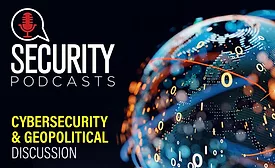Home » Keywords: » global security
Items Tagged with 'global security'
ARTICLES
Special Report: Most Influential People in Security 2025
Vice President, Verisk Global Protection Services, Verisk
Read More
Middle East Escalation, Humanitarian Law and Disinformation – Episode 25
Check out episode 25 of The Cybersecurity & Geopolitical Discussion.
October 23, 2024
Special Report
Robert Grant | Most Influential People in Security
Senior Director of Global Security | Hollister
September 5, 2024
The Money Laundering Machine: Inside the global crime epidemic - Episode 24
Check out episode 24 of The Cybersecurity & Geopolitical Discussion.
July 10, 2024
Geopolitical, cyber and security implications of upcoming British election - Episode 23
Check out episode 23 of The Cybersecurity & Geopolitical Discussion.
June 19, 2024
The real space race: Inside geopolitics and security of a $1.8T industry
Check out episode 22 of The Cybersecurity & Geopolitical Discussion.
April 25, 2024
The Power Shift – Changing global influence in a year of elections
Check out episode 21 of The Cybersecurity & Geopolitical Discussion.
March 20, 2024
Broken China? Separating fact from fiction
Check out episode 20 of The Cybersecurity & Geopolitical Discussion.
February 28, 2024
Sign-up to receive top management & result-driven techniques in the industry.
Join over 20,000+ industry leaders who receive our premium content.
SIGN UP TODAY!Copyright ©2026. All Rights Reserved BNP Media.
Design, CMS, Hosting & Web Development :: ePublishing




.webp?height=168&t=1727723756&width=275)

